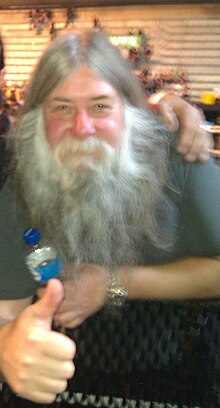Big Mick
| Mick Hughes | |
|---|---|
 |
|
| Born |
Mick Hughes 1960 (age 56–57) Birmingham, England |
| Occupation | Audio Engineer |
| Years active | 1984 – Present |
"Big" Mick Hughes (born 1960) is the live audio engineer for Metallica, a position he has held since 1984.
He was born in 1960 and grew up in Birmingham, England. While an apprentice at British Steel Corporation, he studied electronics at a local technical college and also gained experience on the thriving Midlands music scene including working as a roadie for Judas Priest. In the early 1980s, working for the PA company Techserve he engineered for bands including UB40, Dennis Brown, Yellowman, and Jungle Man before becoming the touring sound engineer for The Armoury Show, who featured ex The Skids singer Richard Jobson and ex Siouxsie and the Banshees guitarist John McGeoch.
The Armoury Show's management company QPrime then asked Mick to engineer a band they had just signed called Metallica (prompting Mick to ask "What's heavy metal?" when told the genre of music they played) starting a relationship that has lasted nearly 30 years.
Big Mick has mixed Metallica at every one of the more than 1500 shows they have performed since their November 1984 tour of Europe, with one exception: On the Load/Reload Tour of 1998, Big Mick was hospitalised with heart palpitations. Michael J "Geese" Graphix, Audio System Engineer for Electrotec and mix engineer for such acts as Guns N' Roses and Nine Inch Nails, stepped in and mixed FOH for two shows: 24 July 1998 in Nashville and 25 July 1998 in Indianapolis. Big Mick recovered and continued his reign at the Metallica helm. His contract with Metallica supposedly states that he has to be called by his moniker, although amongst the band themselves he is known as Full Roar.
The live mixing technique he is often credited with is adding a high mid "click" to the bass drum, which evolved early on with Metallica as a means of lifting Lars Ulrich's bass drums out of the bottom heavy sound. A more recent crusade is to encourage engineers to start soundchecks with ambient microphones (such as vocal microphones) working through to close-miked or gated instruments such as drums. This is in direct opposition to the usual soundcheck which starts with the kick drum and ends with the vocals, but actually makes a lot of sense since the final sound of any instrument is going to be the combination of the ambient and close microphones it can be heard through.
...
Wikipedia
